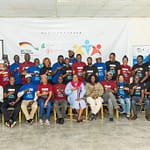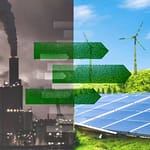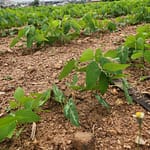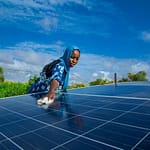Right after the 14th IRENA assembly, which was held from the 17th to the 18th of April in Abu Dhabi, United Arab Emirates, His Excellency, Mr. David Chirchir, the cabinet secretary in charge of Energy and Petroleum of Kenya, engaged in a media briefing alongside host Nicole Bockstaller, the head of communications at IRENA, and a cadre of journalists.
Their dialogue unraveled the intricacies of Africa’s renewable energy journey, from introducing the initiative, the Africa Partnership for Accelerated Renewables (APRA), to addressing the challenges of financing and offering insights into Kenya’s strides and the collaborative effort driving the African continent towards a sustainable energy future.
Read the conversation below for more detailed insight
Nicole Bockstaller: A big thanks to you, sir, for being here. We just had at the IRENA assembly a high-level panel on APRA, a partnership that aims at accelerating renewables in Africa. Sir, what is the reason for APRA, and what can APRA drive as an initiative that other initiatives could potentially not do?

Mr. David Chirchir: Thank you Nicole. APRA, Africa partnership for Accelerated Renewables is an initiative to scale up renewable development to at least some 300 Gigawatts(GW) by 2030, and the driving force really is to look at how we can play significant role in the development of renewables given the fact that we have to scale, we have to come out of what we traditionally call the least cost power development, which in the context of our economy will not be able to scale unless we have this initiative where we are looking at scaling up renewable energy for development of other industries like, Green manufacturing, like processing our own minerals and therefore it’s a partnership which seeks to see how we can in Kenya generate power through power trade or interconnector in the region push that power for processing of Green minerals in The Congo, in Burundi and in neighboring countries. So it’d require us to work in partnership to be able to do power trade, to be able to process minerals from one country and energy from another country, and that requires partnership; it requires ensuring that we do really work with other G7 countries, and just to mention from the onset the support we are already receiving from Germany, the UAE, IRENA, and other partner countries that are participating in this program.
Nicole Bockstaller: Thank you for this opening statement. We have journalists with us today, and I want to go into the media phase immediately and start the Q&A. Any particular questions, please?
Journalist 1: Thank you, minister. Kenya has had a lot of success recently in developing geothermal energy. What advice do you have for other countries in East Africa that also have geothermal potential, and what is Kenya doing to help them develop those resources?
Mr. David Chirchir: I think what we’ve done in Kenya apart from what I mentioned earlier on in the plenary, unbundling the energy sector it’s important to be able to de-risk geothermal fields, we talking about the cost of developing energy, affordability or having to have a country stay competitive, geothermal can be expensive in the initial phase of de-risking the fields. So what we’ve done in Kenya is to have a government body that receives a lot of support from the international partners to de-risk the geo thermal fields, once you go through the de-risking phase in geothermal development which is expensive, geothermal power can be very competitive ,we today in Kenya despite geothermal energy at an average cost of 7 cents per kilo watts as a grid and that is more competitive than solar, wind or hydro and then therefore it is important to de-risk the fields, it’s a very good base load in terms of capacity, availability ,it’s available all the time as compared to solar and wind where availability is at an average of 30% ,so it’s a very good form of energy it can be seen to be expensive because you’re deploying up to USD 3 million per megawatts as again in solar which is today just likely about a million dollar, but once deployed because of availability ,in line with availability to the grid it becomes a very very affordable cost of energy and it can run industry because it’s a base load, it’s available all the time and therefore, de-risking field work with countries who have developed geothermal to appreciate the fact that this form of energy can be very competitive in terms of pricing to the industry and therefore be able to run industry 24/7 because of availability all the time.
Nicole Bockstaller: Thank you. Next question, please
Journalist 2: Minister, you also highlighted the support from your European partners, Germany in particular. Do you feel as if they are now meeting you on a more eye-to-eye basis as equal partners? And do you think that your counterparts are doing enough to address what everybody is saying is the “elephant in the room” here—finance/cold hard cash.
Mr. David Chirchir: Germany is a great partner through KFW, through support in the exchange of information and knowledge. In Kenya, in the geothermal fields we do use KFW to funding ,to de-risk most of our geothermal fields, I think the concern of energy financing being expensive and needing to bring down the cost of financing is got to do more with the fact that we need to do proper return on equity, proper return on employed capital and like I said for geothermal because of availability, when you’re really doing the financial modelling with availability of 100% and you’ve got a good sizeable power plant, most of the partners because of the fact that energy is a good business to do, because don’t forget that for the purpose of de-risking energy generation, we will offer you a license say for 20 years and once you have a license for 20 years with a guaranteed off take and we work on a feeding tariff which is bankable, and which ensures affordability in terms of the return of your investment or the investor’s investment, good debt equity ratio because of the cost of equity is not comparable to the cost of debt, we’re able to do bankable projects and like you asked, do you look at us in the eye when we discuss a win-win? And yes, that is do-able today and APRA comes in to support us, particularly because our economies are not big unless we can foster on mining, unless we can look at options today in Green Hydrogen which will require that the cost of energy is a fit stock to green hydrogen and the development of, say, green ammonia can compete in the world price markets, so that the costs of power that fits into green hydrogen and ammonia are expensive, then we will not be competitive to be able to scale the power that we require to be able to go into that. But more importantly, my colleague from Namibia in the plenary talked about the affordability to the population in terms of access to our people, and we need to really collaborate on the development of industry to be able to support the access to power as it were to industry and to our people in a more affordable way, yeah.
Nicole Bockstaller: Thank you, Next question, on your left-hand side
Journalist 3: From an African-wide perspective, what do you think needs to possibly begin to happen differently in terms of financing because we have not seen that volume of financing for sustainable energy in Africa? I mean much more, as we’re also seeing very slow funding for climate financing. What do you think Africa needs to work on differently to address the funding issue within the African continent instead of looking forward to the western other continents?
Mr. David Chirchir: Yeah, I think I spend a lot of time sometimes in Nigeria, and I know we need to work together as partners to be able to unlock the challenge of financing because for Africa, sometimes the cost of financing is more risk-based, so sometimes the cost of capital to Africa is to finance the risk as opposed to financing the project, and as it is today, renewable energy addresses the challenges of climate change. Climate change can bring down economies. We just saw here when we’ve all been here and witnessed that if you get rains equivalent to volumes for one year in one day, it can bring down infrastructure, businesses, schools, and the whole economy. So unless we address the challenge of climate change through fostering and accelerating climate change through really getting the right cost of energy and not pricing risk, as it were, the challenge of climate change is not limited to Africa, and therefore the risk on climate is not an African issue; it’s a global issue, so we need to work together to price renewable energy not only to service the provision of energy to our people but to address the global climate challenge,which, like I said, can be a challenge. In Africa today, through mitigation and risk of loss of our economic value in droughts, like Kenya, we’re an agricultural economy, and when we’ve seen droughts for three, four, five, or six years running consecutively, we’re unable to feed our people, so we use our foreign earnings sometimes to import food instead of using foreign incomes to do what we’re not able to do on the continent. So it becomes important that we stop pricing risk in the development of renewables because risk, as far as climate change is concerned, is a global issue, and therefore the cost of capital that goes into borrowing money in the west should really be the cost of borrowing money. That is why we’re talking about a different financing architecture to address renewable development and the challenge of climate change.
Nicole Bockstaller: Thank you, minister
Journalist 4: I want to ask a question about the joint collaborative project to explore geothermal resources. I know Kenya has been selling or there is a plan to sell some exact megawatts of geothermal, so how far is that project? Also, I need to know, because I know there have been some collaborative projects with Kenya Energy Group and Rwanda Energy Group just to explore the potential of geothermal energy. Yes, we have resources, but most of them come from Kenya. What do you think is lagging behind those projects, sir?
Mr. David Chirchir: Thank you for that question, we work very closely with Rwanda I think we drilled one well using our KenGen, KenGen is the Kenya energy generating company and after doing the service study but more importantly working through this accelerated partnership for renewable development we are able to mitigate and grow the pie on the de-risking investment because you’re aware that today that like Africa Union will have a geothermal de-risking or renewable de-risking financing and I think through partnership in APRA and the other collaborating countries like Germany, Belgium the US now who are very strong and the world leading developer of geothermal we should be able to grow that basket of financing for de-risking geothermal fields and therefore be able to use this available resource which like I said is a very good base load .So through partnership in APRA through partnership with international participating countries today where we are seeking to grow partnership in the September meeting this year in Nairobi with already participating countries we can really grow the de-risking fund to be able grow the de-risking fund to be able to like I said geothermal is initially expensive in the exploration phase but once you map out all the resource every drilling could be a success and therefore whereas you could be drilling a well for USD 5 million once de-risked and being able to dispatch that power like I said at 67 cents US, that pricing of energy is fairly competitive so I want to encourage us and encourage African countries to participate in APRA initiative, invite the international G7 countries to work with us to grow this de-risking fund financial capacity , address the financial architecture, more importantly ensure that we are able to scale the development ,you know scale also really reduces cost, if you’re developing 10 megawatt the deployment of resources is not like when you’re deploying 100 megawatts because of the spread of cost and therefore partnership with APRA, partnership with our partners ,international partners and more importantly de-risking the challenge of pricing risk becomes very important and as partners with APRA we have our voice working with our international to be able to bring down the cost of capital and bring down the cost of power which then cuts a double edge in terms of growing industry, growing the new accelerated development of green minerals, green hydrogen but more importantly improving access of energy to our people in the continent.
Nicole Bockstaller: Last question sir
Journalist 5: I have two questions. Are there any initiatives similar to the union of African countries aimed at enhancing opportunities for non-aligned nations in Latin America or other regions like the South-South countries? Additionally, how can we ensure that investment in these regions doesn’t lead to the creation of new “banana republics” characterized by dangerous private investments?
Mr. David Chirchir: The south-south corporation is important, but like we just mentioned the issue of risk cuts across the whole continent, who could have expected that in one day you could receive rains in this country in the volume that you would otherwise receive in one year? The drainage systems are not built; they are built to basically take water every day, not to take water for the year in one day, and therefore it becomes important when, like I said, looking at the corporation in removing risk and having a voice to be heard so that the challenge of climate change is real and therefore accelerated renewable development becomes really eminent and necessary. Africa is very rich in renewables, like in Kenya today, where we have only developed 1 gigawatt of geothermal, we have mapped out in terms of service study up to 10 gigawatts, and we are just scratching some of the best wind speeds running up to 16 m/seconds in some places in the very remote areas of Kenya called Turkana, where the origin of mankind has also been established, so it becomes very important even as we corporate in the south-south corporation even the North to south in terms of climate change that line is absolutely distinguished.

Your second question was investment, you know power generation as it were as a business, is very very profitable, most of us who run businesses here do know that you have a big marketing department to market your products when we give you a power purchase agreement to generate energy in terms of return on investment for 20 years you have already market for 20 years, so you have a tariff, economic tariff which has been which possibly a return on equity of about 12% we look at dispatch of say geothermal which availability which is about 92%,you feed in the cost of your capital into the model and you have a market for 20 years in fact as it were the waiting list for generators, for investors to generate energy is quite big but the market is so small, so we need to really match supply and demand and this why we’re saying can we generate demand through this APRA partnership, can we develop demand in green industries minerals, green hydrogen so that we can b scale the supply as APRA partners and be able to move that power through transmission trade, what do you call power trade to the region to be able to do whether green minerals or green hydrogen in whichever location so the real way forward is scaling supply will require demand and for the purpose of profitability in power generation in Kenya the waiting list today for power generators for the small demand is up to the year 2035 we have got investors’ waiting to really fit into the low cost power development plan but unless we get out of this least cost power development plan and be able to open up the demand space in green industries the new innovation in green hydrogen, green ammonia which are also good for the climate action we will be able to address the question of climate change together through APRA in Africa working with partners from the G7 and the other international countries, we should be able to really overcome the challenge of climate change today.
Nicole Bockstaller: Thank you very much sir for your time, This concludes our media briefing. Again, again thank you for your time Have a pleasant IRENA Assembly












